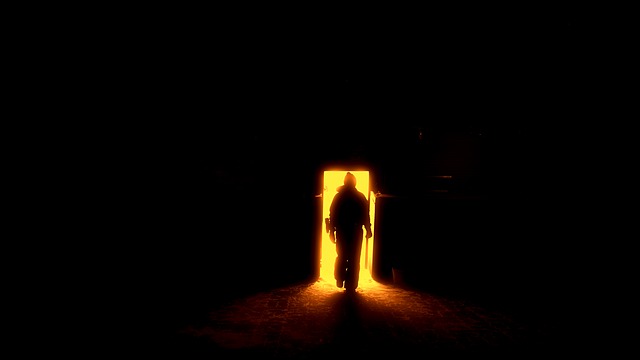I almost didn’t write this post. It just seemed like too big a rock to lift. What we believe about our fate after death carries very real consequences both for our lives and our salvation, which makes this topic a far dicier one than aliens, magic or time travel.
Just a little bit of background how my views on this subject have developed. I personally have always believed that hauntings exist. For most of that time, I have held to the mainstream Evangelical Protestant explanation that they are demonic rather than “ghostly” phenomena – human souls do not linger, but go straight to Heaven or Hell. Adherents of this view (a detailed statement is on the Answers in Genesis website) can point to verses such as the following:
And as it is appointed unto men once to die, but after this the judgment: (Hebrews 9:27)
And it came to pass, that the beggar died, and was carried by the angels into Abraham’s bosom: the rich man also died, and was buried; And in hell he lift up his eyes, being in torments, and seeth Abraham afar off, and Lazarus in his bosom. (Luke 16: 22-23)
Then he said, I pray thee therefore, father, that thou wouldest send him to my father’s house: For I have five brethren; that he may testify unto them, lest they also come into this place of torment. Abraham saith unto him, They have Moses and the prophets; let them hear them. And he said, Nay, father Abraham: but if one went unto them from the dead, they will repent. And he said unto him, If they hear not Moses and the prophets, neither will they be persuaded, though one rose from the dead. (Luke 16: 27-31)
Some might stop right here and say the subject is now closed. Scripture completely rules out the possibility of disembodied human souls remaining behind after death – nothing more to see here. The only spiritual forces on earth are either angels or demons. But other Scriptural passages make things a bit more complicated. We read of at least one human spirit returning from beyond the grave in the Old Testament (I Samuel 28:7-21) and two in the New (Matthew 17:3). I’ll also add a bit of personal testimony – years ago, my parents and I were visiting an older member of our church who had been a widower for some time. During an after-dinner conversation, he told us about one night when he felt the presence of his deceased wife after praying at his bedside. The experience was brief and something along the lines of a spiritual vision – his wife didn’t speak, but silently let him know that she was happy and waiting to meet him again in Heaven.
I know what you’re probably thinking at this point – glorified saints are a completely different class of beings from ghostly apparitions. Granted. But I have one more true account to share. Years ago, I heard a minister relate the following story over the pulpit:
A young woman (now a member of our church) had a dream one night. She was walking alongside her deceased father, who had not been a Christian. They walked and talked for some time. Then they came to a massive gate that slowly opened to reveal a pathway leading downwards into complete darkness. She had an overwhelming sense of dread, as if the place it led to was utterly awful. Her father turned to her. “I have to go back to that horrible place. You still have a chance.” Then he went forward, leaving her to watch as the gate closed behind him. She woke up, confessed her sins, and repented that same night.

I don’t know about you, but I find that to be one of the most powerful “ghost” stories I have ever heard. Some might say it contradicts the passages I’ve quoted above from Luke 16, but I would point out the following: this woman was hearkening to “Moses and the prophets.” She was already under conviction from Scripture, and her dream had come at the end of a long period wrestling with the sin that was in her life. Her heart had reached a place where seeing her father’s spirit would (and did) make a difference.
I would also point out that God still retains ultimate control over both Heaven and Hell (we think of it as Satan’s domain, but in many ways it’s actually his prison). It’s possible for Him to make its inhabitants fulfill his purposes. Spirits of the dead in the ancient world were almost always seen as portents of doom (those with a particularly strong scholarly interest can explore this topic at length in the Project Gutenberg ebook here). While this is primarily a Greco-Roman belief, there are hints of something similar among the Jews of Jesus’s time. Consider the disciples’ initial reaction to Jesus’s reappearance after his death:
But they were terrified and affrighted, and supposed that they had seen a spirit. And he said unto them, Why are ye troubled? and why do thoughts arise in your hearts? Behold my hands and my feet, that it is I myself: handle me, and see; for a spirit hath not flesh and bones, as ye see me have. And when he had thus spoken, he shewed them his hands and his feet. And while they yet believed not for joy, and wondered, he said unto them, Have ye here any meat? And they gave him a piece of a broiled fish, and of an honeycomb. And he took it, and did eat before them. (Luke 37-43)
The idea of the dead (both saints and damned) appearing on earth after death also has some precedent in medieval theology. This excerpt is from a treatise by Thomas Aquinas–straightforwardly titled, Whether the Souls who are in Heaven or Hell are Able to Go from Thence:
…according to the disposition of Divine providence separated souls sometimes come forth from their abode and appear to men, as Augustine, in the book quoted above, relates of the martyr Felix who appeared visibly to the people of Nola when they were besieged by the barbarians. It is also credible that this may occur sometimes to the damned, and that for man’s instruction and intimidation they be permitted to appear to the living; or again in order to seek our suffrages, as to those who are detained in purgatory, as evidenced by many instances related in the fourth book of the Dialogues. There is, however, this difference between the saints and the damned, that the saints can appear when they will to the living, but not the damned; for even as the saints while living in the flesh are able by the gifts of gratuitous grace to heal and work wonders, which can only be done miraculously by the Divine power, and cannot be done by those who lack this gift, so it is not unfitting for the souls of the saints to be endowed with a power in virtue of their glory, so that they are able to appear wondrously to the living, when they will: while others are unable to do so unless they be sometimes permitted. (Summa Theologica)
One thing I want to make clear: I am not a Catholic, so I’m not about to make this argument based solely on the authority of a Catholic source. You don’t have to believe in things like purgatory to admit the possibility that at least some “hauntings” could be caused by the souls of the unredeemed dead (this article here makes an interesting case from a Methodist viewpoint). Many of the spirits in reported encounters appear miserable, confused, and incoherent–things by no means inconsistent with a being eternally separated from God.
While this may be a separate topic on its own, many passages in the New Testament point to different forms of punishment in Hell for different transgressions. Warner J. Wallace, author Cold Case Christianity, analyzes them in detail here . Could it be that for some, this punishment includes wandering the earth in hopelessness until the Day of Judgment? Or that the state of some unredeemed souls is characterized more by sadness than by pain? The following quote from Dante comes to mind:
For such defects, and not for other guilt,
Lost are we and are only so far punished,
That without hope we live on in desire. (Inferno, Canto IV)
But that brings us to perhaps the key reason many Christians are fearful to admit the possibility of ghosts. Some shallow-minded observers could look these concepts and conclude something like the following: “I can live a decent life apart from Christ, and I won’t have to worry about hellfire – I can just come back as a ghost when I die.” That’s most certainly not the case. First of all, God has a infinitely greater knowledge of our sins and their seriousness than we do–His judgment in the matter could very well be the exact opposite of what we expect. Second, the very fact that someone has enough knowledge to use such reasoning means they have enough knowledge to know better:
And that servant, which knew his lord’s will, and prepared not himself, neither did according to his will, shall be beaten with many stripes. But he that knew not, and did commit things worthy of stripes, shall be beaten with few stripes. For unto whomsoever much is given, of him shall be much required: and to whom men have committed much, of him they will ask the more. (Luke 12:47-48)
Let’s also revisit the parable of the rich man and Lazarus for a moment. Even admitting the possibility of souls (both redeemed and unredeemed) returning after death, I still believe Christ intended us to take this parable at face value: those who die without salvation have no remaining appeal or control over their own fate. The rich man in this story could not ask to be sent back himself or even to have anyone else sent back on his behalf. This could only happen if God Himself made the decision – which would be completely uninfluenced by the rich man’s desires. As we read elsewhere in Scripture, “It is a fearful thing to fall into the hands of the living God.” (Hebrews 10:31)
ALTERNATIVE THEORIES

With that being said, the theological framework above would apply to “intelligent” hauntings – that is, ones involving what we would consider a conscious, self-aware spirit. But not all (or even most) accounts of ghostly apparitions fall into this category. Many involve a limited, repetitive sequence of events around a certain time at a particular place – like a recording playing on an endless loop. An example would be the Roman “ghost legion” sighted in York, England.
For cases like these, there are a few other theories I find particularly compelling. Scripturally, we know that human beings are composed of a body as well as at least two immaterial components – a soul and a spirit. But what if there are some additional “lesser” parts of our immaterial nature? While the core consciousness (soul and/or spirit) departs immediately for Heaven or Hell after death, could a remnant of the thoughts, feelings, will, etc remain behind? Perhaps this could manifest as a “shade” or “shadow” of a person rather than the person itself. One analogy would be a robot with limited programming—lacking true consciousness and able to act, think and communicate only up to a certain point. I can see this being especially applicable to the case of people who died by violence or murder—perhaps part of their being was “shattered” or “fragmented” by having their life forcibly ended before its appointed time. It’s not a stretch to say the act of murder (being fundamentally opposed to the order of Creation) produces a reverberation or “disturbance” in the spiritual realm. In Genesis we see God tell Cain that “the voice of thy brother’s blood crieth unto me from the ground.” Could this mark the beginning of a semi-literal phenomenon that continues to this day?
Furthermore, some reported apparitions have been of people who are still alive – sometimes appearing to those very people themselves (the phenomenon of “crisis apparitions” is studied in-depth here, though I don’t necessarily endorse the author’s worldview or conclusions). For me, these accounts bring to mind the following passage in Acts:
And as Peter knocked at the door of the gate, a damsel came to hearken, named Rhoda. And when she knew Peter’s voice, she opened not the gate for gladness, but ran in, and told how Peter stood before the gate. And they said unto her, Thou art mad. But she constantly affirmed that it was even so. Then said they, It is his angel. (Acts 12: 13-15)
We also read this in Matthew:
Take heed that ye despise not one of these little ones; for I say unto you, That in heaven their angels do always behold the face of my Father which is in heaven. (Matthew 18:10)
The implication seems to be a spiritual being that not only watches over each person but does things on their behalf. Do these beings in some sense assume the very identity of the persons God has assigned to them—acting as an extension of that person at times? In Acts, we also read of Paul seeing a vision of a “man of Macedonia” who asks him to help not “them” but “us.” (Acts 16:9)
The unseen realm is likely a more complex and multi-layered place than we can ever imagine. Does this mean ghosts exist? Possibly. Does this mean we should seek out and talk to them? Not so much. “Exploring” the spirit realm in the manner of the secular world’s “paranormal investigators” (and the more overt necromancers of the past) is inherently the equivalent of swimming through shark-infested waters. Demons still exist, even if we don’t ascribe every single “haunting” in the world to them. If we believe some books of the biblical apocrypha, idol-worship itself began with seemingly innocent veneration of the dead:
For a father afflicted with untimely mourning, when he hath made an image of his child soon taken away, now honoured him as a god, which was then a dead man, and delivered to those that were under him ceremonies and sacrifices.
Thus in process of time an ungodly custom grown strong was kept as a law, and graven images were worshipped by the commandments of kings. (Wisdom of Solomon 14:15-16)
THE ROLE OF MYSTERY

Regarding topics like this, there is something to be said for embracing mystery. I myself keep coming back to this quote from Hamlet (itself, appropriately, one of the most enduring ghost stories of all time):
“There are more things in Heaven and Earth, Horatio, then are dreamt of in your philosophy.” (Hamlet, Act I, Scene IV)
Scripture itself tells us of God’s “mysterious ways” that are “past finding out.” Trying to explain absolutely everything can very well rob us of one of the most wondrous aspects of life and faith. God is not bound by our preconceptions or rigid categories—not everything we see or experience is going to have a rational, theologically precise explanation.
At a fundamental level, I’m approaching this topic as a fiction writer, so my final thoughts are for my fellow writers. I haven’t spent much time here on a “prescriptive” framework like some of my other work on fictional subjects. In a lot of ways, this particular topic defies it. If nothing else, I hope I’ve contributed some original thoughts in an ongoing conversation. I invite you all to join me again as we continue our journey through the Uncharted Corners of Heaven and Earth.


Shared this with a Facebook group. You raise some good questions.
I’ve never seen it, but your “lesser parts of our immaterial nature” idea reminds me of the premise of the British horror classic “The Stone Tape.”
What secular movie or book out there right now, in your opinion, best reflects a Biblical idea of what ghosts are?
LikeLike
Hmmm…. I’m actually not sure on that one. The secular portrayals I’ve come across usually stray pretty far from biblical parameters. One interesting Christian novel I’ve come across is “Nightmare” by Robin Parrish. It’s been a while since I read it, so my memories somewhat hazy as to how exactly he parsed the topic, but I do remember that he went deeper than the standard pat answers regarding the “demonic” hypothesis. The “secular” example I most often think about is the ghost in Hamlet. Debate about ghosts was actually a hot button topic in Shakespeare’s time, and he actually integrates the unresolved nature of the question into his story. Hamlet, upon seeing the ghost of his father, is unsure whether it’s a “spirit of health or goblin damned”. The implication seems to be that his father has departed to either Heaven or Hell, but has come back for a divinely appointed purpose (avenging his own death). This squares the most with Thomas Aquinas’s viewpoint, at any rate.
LikeLiked by 1 person